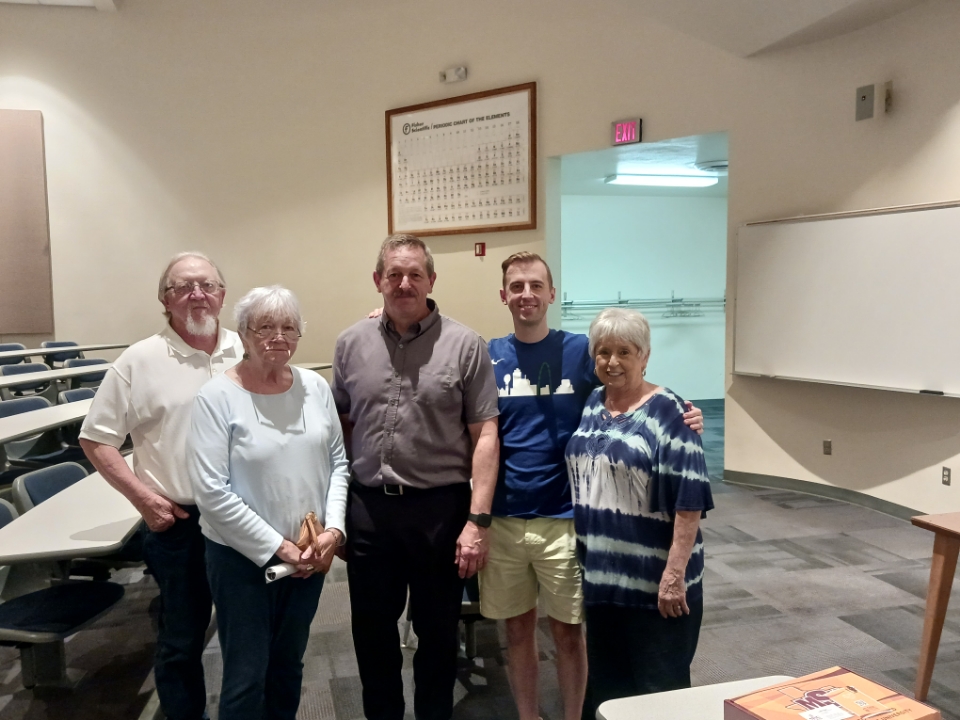Research skills, drive to succeed was cultivated at MSU Texas
As a teen Bill Schmitz had his eyes set on going to college at Texas Tech. That didn’t quite work out.
But when one door closed, another one opened and it’s a life lesson Schmitz applied to his life and 30-year career in drug discovery and research. The Midwestern State University alum shared some of his methods and keys to success as part of the MSU Texas Alumni Inspire series held in Bolin Science Hall.
Schmitz grew up in Wichita Falls and had interest in science at an early age. Taking classes from Roberta Sund at Wichita Falls High School and then from her husband Eldon Sund at MSU strengthened his resolve to pursue a career in that field.
Schmitz is now Senior Director of Medicinal Chemistry with Eli Lilly and Company.
“Honestly, I was planning to go to Texas Tech,” Schmitz said of his path to MSU Texas. “Our family didn’t have a lot of resources. I had to work to support my own, take jobs to pay my tuition.”
His choice for a dorm at Tech didn’t work out and his potential roommate fell through. “I took that as a sign,” he said. “Like most college students, I didn’t know what I was doing. It kind of evolved. I was always interested in science. I saw that if you can do science, you can go to graduate school. I got my Ph.D. (at Texas A&M) and didn’t pay a thing. I had a stipend.”
“I did organic research with Eldon Sund (who is a 60-year member of the American Chemical Society who focused on heterocyclics), and it was good because you need a tough skin to do this work,” Schmitz said. “You were working 24/7 and it wasn’t enough. You have to have a strong constitution. Nobody ever game me a trophy for showing up.”
Two important points he tried to share with the class were about connections and about not giving up. Scientific research isn’t about figuring something out to perfection the first time. There are days where progress isn’t evident.
“People don’t like failure, right? It’s really keeping your eye on what’s worthwhile,” Schmitz said. “The biggest thing you can do is make a difference in the world, in whatever it is in your life or in society. People can resonate with that – making a difference. If you keep your eye focused on that, the failures are going to come with it.”
Even those not in the science field have ways to relate, he said. “If you’re a parent you’re failing all the time, but it’s worth it.”
Schmitz received a U.S. patent in 2017 for Tricyclic Compounds as Anticancer Agents, and in 2013, he received one for Inhibitors of PDE10.
One thing Schmitz hasn’t accomplished is doing it all alone. He reminded the students that connections and collaboration are vital.
“You get to know people and build those connections,” Schmitz said. “At this point, I’ve either been in conversations and business development deals or classrooms with five different Nobel Prize winners.
“Build your own network, that’s how you get jobs. You can be as brilliant as you want in your little box and it never really goes anywhere.”
Doubt is part of the journey and when a door closes, as it did on Schmitz’s Texas Tech plans, then another one opens up splendidly.
“At one point, I thought I’d like to be a doctor. But right or wrong, I thought I’m not smart enough to be a doctor,” Schmitz said. “I didn’t know what I intended to do, but I’ve always been interested in making things. I didn’t really think of it like making molecules, but I was always interested in medicine. It’s fascinating that you can chew on a leaf or something and they can have these effects.”

